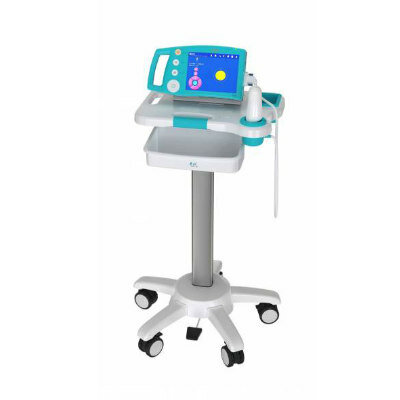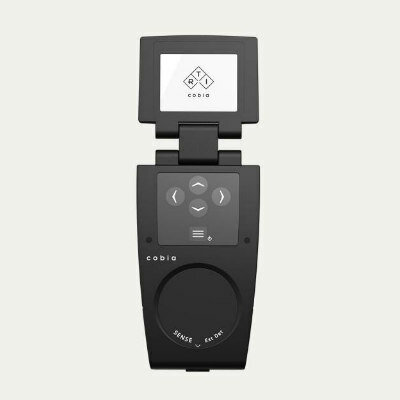MRI-Equipped Ambulance Could Be a Game-Changer for Stroke Care
|
By MedImaging International staff writers Posted on 03 Nov 2023 |

The critical nature of timing in treating a stroke is widely recognized, and faster medical response often leads to more favorable recoveries. This urgency is especially relevant with medications like clot-dissolving tPA, which must be administered within a narrow timeframe. The challenge, however, lies in the timely execution of necessary diagnostic studies. Now, the findings of a new trial in which researchers equipped an ambulance with a portable MRI have demonstrated the potential of an MRI-equipped ambulance in treating stroke patients.
Currently, some hospitals deploy mobile stroke units with CT scanners, but these are not without their drawbacks, such as the risk of radiation. Portable MRIs, on the other hand, are free from radiation hazards and their lower magnetic fields eliminate concerns about the proximity of metal, thereby allowing for the use of other medical devices simultaneously. Unlike traditional MRI, portable units can potentially serve to identify strokes even in patients who lack a defined timeline of their stroke's onset. The latest human trial by researchers at the Medical University of South Carolina (MUSC) was based on an earlier trial that had shown it was possible to obtain MRI images in a moving ambulance on a standardized calibration model.
In the new human trial, the research team equipped an ambulance from Charleston County EMS with a portable MRI and managed to take images while driving at a slow pace around a parking area. The trial produced diagnostic-grade images from a healthy volunteer, which were then sent to hospital radiologists to be examined. While these initial findings are promising, the researchers will continue to investigate whether high-quality images can be captured at the ambulance's normal operating speed. The team is also redesigning the ergonomics of how the MRI can fit within the ambulance space. Advancements in technology and further clinical research could make MRI-equipped ambulances a revolutionary tool in emergency medical care, offering critical diagnostic capabilities to stroke patients en route to the hospital.
“If you think about where defibrillators were 50 years ago, they were hundreds of pounds, and it really took out-of-the-box thinking to imagine they could be portable. And now, they're public access points,” said Dustin LeBlanc, M.D., director of Prehospital Medicine and associate chief medical officer for Emergency Management at MUSC. “The MRI-equipped ambulance is just another example of technology helping us to develop ways to make things faster, lighter, smaller, more portable and to get it to the patient as quickly as possible.”
“If you're somebody who could just receive tPA, you might go to a local hospital, while those who need to have advanced procedures, such as interventional neuroradiology, would go to a different hospital,” said Jillian Harvey, Ph.D., a professor in the College of Health Professions. “The imaging provided by the portable MRI scanner in the ambulance could help make that decision. If we can get that information in transit and the decision process going before they even arrive at the hospital, then we can shorten the time to care and treatment.”
Related Links:
MUSC
Latest MRI News
- PET/MRI Improves Diagnostic Accuracy for Prostate Cancer Patients
- Next Generation MR-Guided Focused Ultrasound Ushers In Future of Incisionless Neurosurgery
- Two-Part MRI Scan Detects Prostate Cancer More Quickly without Compromising Diagnostic Quality
- World’s Most Powerful MRI Machine Images Living Brain with Unrivaled Clarity
- New Whole-Body Imaging Technology Makes It Possible to View Inflammation on MRI Scan
- Combining Prostate MRI with Blood Test Can Avoid Unnecessary Prostate Biopsies
- New Treatment Combines MRI and Ultrasound to Control Prostate Cancer without Serious Side Effects
- MRI Improves Diagnosis and Treatment of Prostate Cancer
- Combined PET-MRI Scan Improves Treatment for Early Breast Cancer Patients
- 4D MRI Could Improve Clinical Assessment of Heart Blood Flow Abnormalities
- MRI-Guided Focused Ultrasound Therapy Shows Promise in Treating Prostate Cancer
- AI-Based MRI Tool Outperforms Current Brain Tumor Diagnosis Methods
- DW-MRI Lights up Small Ovarian Lesions like Light Bulbs
- Abbreviated Breast MRI Effective for High-Risk Screening without Compromising Diagnostic Accuracy
- New MRI Method Detects Alzheimer’s Earlier in People without Clinical Signs
- MRI Monitoring Reduces Mortality in Women at High Risk of BRCA1 Breast Cancer
Channels
Radiography
view channel
Novel Breast Imaging System Proves As Effective As Mammography
Breast cancer remains the most frequently diagnosed cancer among women. It is projected that one in eight women will be diagnosed with breast cancer during her lifetime, and one in 42 women who turn 50... Read more
AI Assistance Improves Breast-Cancer Screening by Reducing False Positives
Radiologists typically detect one case of cancer for every 200 mammograms reviewed. However, these evaluations often result in false positives, leading to unnecessary patient recalls for additional testing,... Read moreUltrasound
view channel
Deep Learning Advances Super-Resolution Ultrasound Imaging
Ultrasound localization microscopy (ULM) is an advanced imaging technique that offers high-resolution visualization of microvascular structures. It employs microbubbles, FDA-approved contrast agents, injected... Read more
Novel Ultrasound-Launched Targeted Nanoparticle Eliminates Biofilm and Bacterial Infection
Biofilms, formed by bacteria aggregating into dense communities for protection against harsh environmental conditions, are a significant contributor to various infectious diseases. Biofilms frequently... Read moreNuclear Medicine
view channel
New SPECT/CT Technique Could Change Imaging Practices and Increase Patient Access
The development of lead-212 (212Pb)-PSMA–based targeted alpha therapy (TAT) is garnering significant interest in treating patients with metastatic castration-resistant prostate cancer. The imaging of 212Pb,... Read moreNew Radiotheranostic System Detects and Treats Ovarian Cancer Noninvasively
Ovarian cancer is the most lethal gynecological cancer, with less than a 30% five-year survival rate for those diagnosed in late stages. Despite surgery and platinum-based chemotherapy being the standard... Read more
AI System Automatically and Reliably Detects Cardiac Amyloidosis Using Scintigraphy Imaging
Cardiac amyloidosis, a condition characterized by the buildup of abnormal protein deposits (amyloids) in the heart muscle, severely affects heart function and can lead to heart failure or death without... Read moreGeneral/Advanced Imaging
view channel
New AI Method Captures Uncertainty in Medical Images
In the field of biomedicine, segmentation is the process of annotating pixels from an important structure in medical images, such as organs or cells. Artificial Intelligence (AI) models are utilized to... Read more.jpg)
CT Coronary Angiography Reduces Need for Invasive Tests to Diagnose Coronary Artery Disease
Coronary artery disease (CAD), one of the leading causes of death worldwide, involves the narrowing of coronary arteries due to atherosclerosis, resulting in insufficient blood flow to the heart muscle.... Read more
Novel Blood Test Could Reduce Need for PET Imaging of Patients with Alzheimer’s
Alzheimer's disease (AD), a condition marked by cognitive decline and the presence of beta-amyloid (Aβ) plaques and neurofibrillary tangles in the brain, poses diagnostic challenges. Amyloid positron emission... Read more.jpg)
CT-Based Deep Learning Algorithm Accurately Differentiates Benign From Malignant Vertebral Fractures
The rise in the aging population is expected to result in a corresponding increase in the prevalence of vertebral fractures which can cause back pain or neurologic compromise, leading to impaired function... Read moreImaging IT
view channel
New Google Cloud Medical Imaging Suite Makes Imaging Healthcare Data More Accessible
Medical imaging is a critical tool used to diagnose patients, and there are billions of medical images scanned globally each year. Imaging data accounts for about 90% of all healthcare data1 and, until... Read more
Global AI in Medical Diagnostics Market to Be Driven by Demand for Image Recognition in Radiology
The global artificial intelligence (AI) in medical diagnostics market is expanding with early disease detection being one of its key applications and image recognition becoming a compelling consumer proposition... Read moreIndustry News
view channel
Bayer and Google Partner on New AI Product for Radiologists
Medical imaging data comprises around 90% of all healthcare data, and it is a highly complex and rich clinical data modality and serves as a vital tool for diagnosing patients. Each year, billions of medical... Read more




















